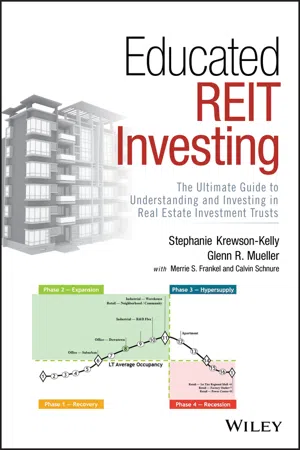
Educated REIT Investing
The Ultimate Guide to Understanding and Investing in Real Estate Investment Trusts
- English
- ePUB (mobile friendly)
- Available on iOS & Android
Educated REIT Investing
The Ultimate Guide to Understanding and Investing in Real Estate Investment Trusts
About this book
Learn to invest in REITs with confidence and skill with this powerful resource
Educated REIT Investing is the ultimate resource for investors, financial advisors, and students interested in learning how to invest in real estate investment trusts (REITs)—one of the only asset classes to significantly outperform the S&P 500 Index over the last 25 years.
Written by Stephanie Krewson-Kelly and Glenn R. Mueller, PhD., both accomplished REIT authors and investors with six decades of accumulated industry experience between them, Educated REIT Investing provides all the basics and history, then blends pragmatic strategies and advice with a thorough exploration of the fundamentals and nuances of the REIT industry. Topics include:
- Basic information about REITs and the REITs industry
- Terminology specific to the REIT industry, explained in plain-English
- Historical REIT industry performance tables and trading perspectives
- Analysis and equations needed to calculate key metrics used to identify the suitability of companies for investment purposes, illustrated with simple examples
This book is perfect for anyone looking for a straightforward, easy-to-understand resource to establish or improve their understanding and analysis of real-estate investment trusts.
Frequently asked questions
- Essential is ideal for learners and professionals who enjoy exploring a wide range of subjects. Access the Essential Library with 800,000+ trusted titles and best-sellers across business, personal growth, and the humanities. Includes unlimited reading time and Standard Read Aloud voice.
- Complete: Perfect for advanced learners and researchers needing full, unrestricted access. Unlock 1.4M+ books across hundreds of subjects, including academic and specialized titles. The Complete Plan also includes advanced features like Premium Read Aloud and Research Assistant.
Please note we cannot support devices running on iOS 13 and Android 7 or earlier. Learn more about using the app.
Information
PART I
AN INTRODUCTION TO REITs
CHAPTER 1
What Is a REIT?
Table of contents
- Cover
- Table of Contents
- Foreword
- Preface
- Acknowledgments
- About the Authors
- PART I: AN INTRODUCTION TO REITs
- PART II: INVESTING IN REITs
- Conclusion
- APPENDIX A: REITs Listed Alphabetically by Company Name
- APPENDIX B: REITs Listed Alphabetically by Ticker Symbol
- APPENDIX C: REITs by Sector
- Glossary
- Index
- End User License Agreement